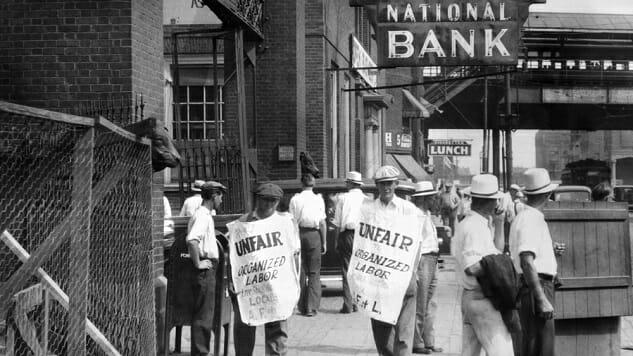The State of the Union: GDC, Jen MacLean, and Game Workers Unite
Photo courtesy of Shutterstock
There were a number of valid concerns and hot topics leading up to GDC 2018, but among the most important was unionization in games development. Both in an official capacity and on a grassroots level, the discussion about the organizing and banding together of the industry’s most vulnerable members was on everyone’s mind, from the student to the seasoned game designer.
The two biggest events of the week centered on the movement Game Workers Unite and an IDGA roundtable discussion hosted by IDGA executive director Jen MacLean. The former was born partially in response to the latter: Game Workers Unite came about in the wake of the roundtable’s announcement, and concern over the wording of the discussion’s description, which read in part: “what unionization could mean for game devs—including outcomes both good and bad.” Combined with a dismissive Kotaku interview and a conversation with USGamer that hardly inspired confidence (in which MacLean stated capital, not unions, would save industry jobs), the question hung in the air: could the leaders of the industry’s organizations most dedicated to advocating for businesses, not employees, possibly hope to protect and sympathize with its workers?
Seeking the answer to that question was Liz Ryerson, one of the organizers of Game Workers Unite. After the announcement of the IGDA roundtable, she reached out on Twitter to debate Jen MacLean’s position on unionization, landing on the conclusion that a mini-protest should be formed during the session to show support and solidarity for organizing workers. The ensuing Discord group decided to create and distribute literature and buttons (created by Night in the Woods developer Scott Benson) during the event to raise awareness, as well as attend the roundtable discussion to see what the IDGA had to say, hoping that, when faced with real people, the organization might be held accountable.
There was a lot of anticipation leading up to the event and unsurprisingly, the roundtable was over capacity. Many folks remained outside to show their support, including Ryerson and Paste Magazine’s Dante Douglas. Says Ryerson, “The whole intent was to get as many people to show up in support of unionization as possible so that the IGDA would have to address those people’s concerns face-to-face.” And it seemed to have worked. The limited space was far too small to hold the crowd—and the vast majority were in support of unions. “Many people afterwards told me that it felt like it was the entire room vs. MacLean.”
From the people I’ve spoken to who were at the discussion, and examining the livetweets of other attendees present at the time, the talk consisted mostly of people sharing their personal stories and arguing for the need for unions, with MacLean playing “devil’s advocate,” offering resistance to every point raised. Leading up to the show, many cautioned against interpreting the IGDA’s approach cynically, but from the eyewitness accounts, the alarm may have been justified. “MacLean had a clear anti-union agenda and attempted to drive the discussion that way despite strong sentiment to the contrary in the room,” one developer told me. “She was pretty rude, talking over people and constantly telling us how little time we had to discuss while taking a lot of that time to restate her points and questions. She also tried to control the discussion by directing the volunteers with the microphone to specific people, and demanding it back after just one or two people got the chance to speak. There was a lot of discussion about improving education that got twisted by MacLean into unions controlling who gets hired.” At one point she even seemed to exhibit a bizarre streak of ableism, steering the conversation towards “aptitude,” “implying that disabled people inherently lacked aptitude for the job” and strongly suggesting they didn’t deserve equal pay or special accommodations for their condition, declaring that “everyone in the room had a disability” in a tone, my source adds, “that said ‘get over yourselves’”.
Another developer corroborated, “MacLean did mention aptitude several times, implying, in my mind, that unions would let in people who weren’t qualified for the job. [T]he comment about ‘we all have a disability, visible or invisible’ …I think was a very tone-deaf way of saying something like ‘Each of us is struggling with something,’ but of course totally erases people with actual disabilities. She did seem to be pushing the idea that having a union would mean hiring people who were looking for a free ride or not willing to pull their weight, as well as bringing up some other anti-union stereotypes.” Both developers stated that MacLean apologized for her comment, but did not address the sentiments she expressed leading up to it.
Nonetheless, says one of my sources, people did get to speak their mind. Says the source who filled me in on MacLean’s ableist comments, “Some told stories of personal mistreatment in games, some told about positive experiences with organization. Squinky, for example, brought up the potential power of collective bargaining to make spaces more accessible in their grad school, and a developer from the studio in France that’s currently striking talked about his experience organizing and striking. Most of us talked about what we hoped a union might help us achieve.” Some union reps were also present, adds my second source, “both from IATSE and from SJTV in France. The IATSE folks were incredibly knowledgeable in US labor law, and were able to bring actual facts to the table to counter Jen’s fearmongering and sowing of uncertainty and doubt. I read in another piece that she hadn’t invited them, and I really wonder who did.”